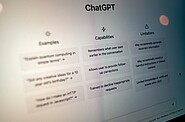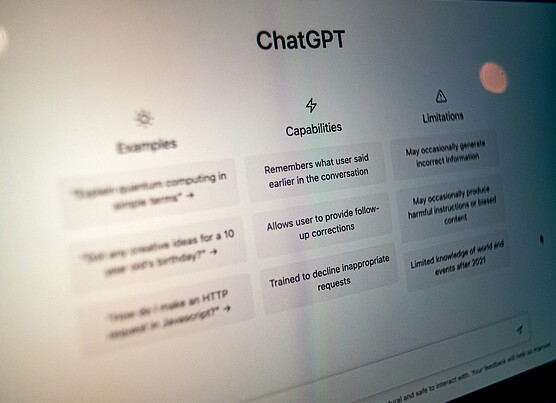Profile
Anne-Kathrin Klesse obtained her PhD from Maastricht University and then worked at Tilburg University as an Assistant Professor in Marketing. In October 2016, she joined Rotterdam School of Management, Erasmus University. She frequently spent time at Stanford Graduate School of Business as a visiting scholar.
In her research, Anne-Kathrin studies consumer judgement and decision making, with a specific focus on how technology augments human behavior. In one stream of research, she explores whether different device interfaces (e.g., voice-operated versus touch-, or click-operated) prompt different decisions. In another stream, she focuses on understanding human lay beliefs and behavior related to algorithms, AI, and GenAI. Because of the later, she has been invited to become the academic director of the Psychology of AI lab at the Erasmus Centre for Data Analytics (ECDA).
Her research has been awarded with the prestigious VENI grant (by NWO) and was published in leading Marketing journals, such as Journal of Consumer Research (JCR), Journal of Marketing Research (JMR), and Journal of Marketing (JM).
Anne-Kathrin currently serves at the Editorial Review Board for the International Journal of Research in Marketing (IJRM) and JM.
She is the PhD program coordinator of her department, coordinates the Behavioral Experts track in the (International) Business Administration Bachelor's programme (BA/IBA), and teaches a module on Technology-Augmented Behavior.
Publications
Article (11)
Academic (11)
-
Cadario, R., Li, Y., & Klesse, A. K. (Accepted/In press). Bridging the Knowledge Gap: Mapping Carbon Emissions to Food Items Facilitates Choices of Plant-Based over Animal-Based Items. Appetite, 208, Article 107910. https://doi.org/10.1016/j.appet.2025.107910
-
Celiktutan, B., Klesse, A. K., & Tuk, M. A. (2024). Acceptability lies in the eye of the beholder: Self-other biases in GenAI collaborations. International Journal of Research in Marketing, 41(3), 496-512. https://doi.org/10.1016/j.ijresmar.2024.05.006
-
Mariadassou, S., Klesse, A. K., & Boegershausen, J. (2024). Averse to what: Consumer aversion to algorithmic labels, but not their outputs? Consumer aversion to algorithmic labels, but not their outputs? Current Opinion in Psychology, 58, Article 101839. https://doi.org/10.1016/j.copsyc.2024.101839
-
Zhang, Y., Tuk, M., & Klesse, A. K. (2024). Giving AI a Human Touch: Highlighting Human Input Increases the Perceived Helpfulness of Advice From AI Coaches. Journal of the Association for Consumer Research, 9(3), 344-356. https://doi.org/10.1086/730710
-
Garbinsky, E. N., & Klesse, A. K. (2021). How (and When) the Presence of Food Decreases Enjoyment of Customer Experiences. Journal of Marketing Research, 58(4), 705-720. https://doi.org/10.1177%2F00222437211010465
-
Klesse, A. K., Cornil, Y., Dahl, DW., & Gros, N. (2019). The Secret Ingredient Is Me: Customization Prompts Self-Image-Consistent Product Perceptions. Journal of Marketing Research, 56(5), 879-893. https://doi.org/10.1177/0022243719846063
-
Gai, PJ., & Klesse, A. K. (2019). Making Recommendations More Effective Through Framings: Impacts of User- versus Item-Based Framings on Recommendation Click-Throughs. Journal of Marketing, 83(6), 61-75. https://doi.org/10.1177/0022242919873901
-
Geipel, J., Hadjichristidis, C., & Klesse, A. K. (2018). Barriers to sustainable consumption attenuated by foreign language use. Nature Sustainability, 2018(1), 31-33. https://doi.org/10.1038/s41893-017-0005-9
-
Klesse, A. K., Levav, J., & Goukens, C. (2015). The Effect of Preference Expression Modalities on Self-Control. Journal of Consumer Research, 42(4), 535-50.
-
Garbinsky, EN., Klesse, A. K., & Aaker, J. (2014). Money in the Bank: Feeling Powerful Increases Saving. Journal of Consumer Research, 38(6), 1047-62.
-
Klesse, A. K., Goukens, C., Geyskens, K., & de Ruyter, K. (2012). Repeated Exposure to the Thin Ideal and Implications for the Self: Two Weight Loss Program Studies. International Journal of Research in Marketing, 29(4), 355-62.
Chapter (1)
Academic (1)
-
Klesse, A. K., Zhang, Y., & Tuk, M. (2024). Algorithm Aversion. In Elgar Encyclopedia of Consumer Behavior (pp. 5-8). Edward Elgar Publishing. https://doi.org/10.4337/9781803926278.ch02
Review article (1)
Academic (1)
-
Goukens, C., & Klesse, A. K. (2022). Internal and external forces that prevent (vs. Facilitate) healthy eating: Review and outlook within consumer Psychology. Current Opinion in Psychology, 46, Article 101328. https://doi.org/10.1016/j.copsyc.2022.101328
Courses
BSc Project Behavioural Experts
- Study year: 2024/2025, 2023/2024, 2022/2023, 2021/2022
- Code: B3T3103
- Level: Bachelor 3, Bachelor 3
Technology Augmented Behaviour
- Study year: 2024/2025, 2023/2024, 2022/2023, 2021/2022
- Code: B3T3104
- Level: Bachelor 3, Bachelor 3, Bachelor 3
Topics in Marketing Research A
- Study year: 2024/2025
- Code: BERMASC054
- Level: PhD
Past courses
Specialization Module on Consumer Behavior
- Study year: 2023/2024, 2019/2020, 2017/2018
- Code: BERMASC039
- ECTS: 3 Level: Master, PhD
Marketing Beyond Borders: Managing Cross Cultural Challenges
- Study year: 2020/2021, 2018/2019, 2016/2017
- Code: BMME103
- ECTS: 6 Level: Master, Master, Master, Master
Marketing Honours Class
- Study year: 2020/2021, 2019/2020, 2018/2019, 2017/2018, 2016/2017
- Code: BMHONMM
- ECTS: 10 Level: Master, Master, Master, Master
Featured in the media
-
People think GenAI is perfectly fine in their own work. For others, not so much
People are commonly blind to how much influence Generative AI (GenAI) has over their work, when they choose to enlist the support of technologies such as Chat GPT to complete professional or educational tasks, new research finds.…
Thursday, 15 August 2024 -
New Research Reveals How Blind We Are to the Influence of AI
Research from associate professors Dr Mirjam Tuk and Dr Anne Kathrin Klesse alongside PhD candidate Begum Celiktutan in this article about people often being blind to how much influence Generative AI (Gen AI) has over their work,…
Wednesday, 14 August 2024 -
New Research Reveals How Blind We Are to the Influence of AI
Agency-distributed article about RSM research by Mirjam Tuk, Anne-Kathrin Klesse and Begum Celiktutan that finds people are commonly blind to how much influence Generative AI (Gen AI) has over their work when they choose to enlist…
Monday, 22 July 2024 -
Presence of food may decrease enjoyment of customer experiences, study
Anne-Kathrin Klesse, Associate Professor of Marketing Management at RSM, was the co-author of a study which showed that the presence of food decreases the enjoyment of a target experience across a wide array of consumption…
Tuesday, 23 November 2021 -
Making Recommendations More Effective through Framings: Impacts of User- versus Item-Based Framings on Recommendation Click-Throughs
An article written on research co-conducted by Anne-Kathrin Klesse of RSM. The research discusses that user-based framing of recommendations provides additional information on taste matching to customers compared to item-based…
Tuesday, 14 April 2020 -
Research: customisation isn’t always positive for consumers
An interview with Anne-Kathrin Klesse regarding her new research that shows customisation influences product perception of consumers .“Customizers who view themselves as unhealthy eaters perceived a customised muesli as less…
Friday, 31 January 2020 -
Why customization isn’t always positive
Technological advances allow customers to determine specific product characteristics by choosing particular ingredients, features or design elements in helping to build a product outcome. Retail stores (such as Pinkberry),…
Monday, 27 January 2020 -
The Science Behind "Recommended for You"
Phyliss Jia Gai, doctoral candidate in Marketing Management at RSM, and Anne-Kathrin Klesse, Assistant Professor of Marketing Management at RSM, have written the article 'The Science Behind "Recommended for You"'. The article…
Wednesday, 2 October 2019 -
Insectenburger smaakt wel in het Engels
Anne-Kathrin Klesse, Assistant Professor in Marketing at RSM, has conducted a study which shows that describing sustainable but repulsive products in a second language ensures that people are more inclined to eat them. …
Saturday, 3 March 2018 -
Lezers: liever helemaal niets, dan insectenhap eten
Anne-Kathrin Klesse, Assistant Professor in Marketing at RSM, has conducted a study from which shows that describing sustainable but repulsive products in a second language ensures that people are more inclined to eat them. …
Thursday, 1 March 2018 -
Uitslag Stelling: ’Wat de boer niet kent...’
This article mentions the study conducted by Anne-Kathrin Klesse, Assistant Professor in Marketing at RSM, which shows that the consumer is more willing to eat mealworms or in vitro meat if it has a product description in another…
Thursday, 1 March 2018 -
Meelwormenkoekjes? Getsie, Insect Based Cookies, Lekker!
Anne-Kathrin Klesse, Assistant Professor in Marketing at RSM, has conducted a study from which shows that describing sustainable but repulsive products in a second language ensures that people are more inclined to eat them. …
Wednesday, 28 February 2018 -
Vies eten lekkerder in andere taal
Anne-Kathrin Klesse, Assistant Professor in Marketing at RSM, has conducted a study from which shows that describing sustainable but repulsive products in a second language ensures that people are more inclined to eat them. This…
Wednesday, 28 February 2018 -
Duurzame Maar 'Walgelijke' Producten Worden Aantrekkelijker In Een Tweede Taal
Anne-Kathrin Klesse, Assistant Professor in Marketing at RSM, has conducted a study from which shows that describing sustainable but repulsive products in a second language ensures that people are more inclined to eat them. …
Wednesday, 28 February 2018 -
Beschrijving in andere taal maakt afstotelijke producten aantrekkelijker
Anne-Kathrin Klesse, Assistant Professor in Marketing at RSM, has conducted a study from which shows that describing sustainable but repulsive products in a second language ensures that people are more inclined to eat them. …
Tuesday, 27 February 2018 -
Duurzame maar 'weerzinwekkende' producten aantrekkelijker in tweede taal
Anne-Kathrin Klesse, Assistant Professor in Marketing at RSM, has conducted a study from which shows that describing sustainable but repulsive products in a second language ensures that people are more inclined to eat them. …
Tuesday, 27 February 2018 -
Business school RSM hosting open day for professionals
This Saturday RSM, according to the Financial Times one of Europe’s top 10 business schools, is organising an open day for professionals aimed at helping them gain insight in how they can further develop their business skills. On…
Friday, 12 May 2017 -
Business school RSM organiseert open dag voor professionals
This Saturday RSM, according to the Financial Times one of Europe’s top 10 business schools, is organising an open day for professionals aimed at helping them gain insight in how they can further develop their business skills. On…
Thursday, 11 May 2017
Featured on RSM Discovery
Discover the double standards in the acceptability of using generative AI (GenAI) at work. Research reveals people perceive their own use as inspiration while seeing others' use as outsourcing, impacting marketing, policymaking, and education.
The success of AI depends on people’s beliefs and use. So, it is important to focus on the people who interpret and interact with AI.










